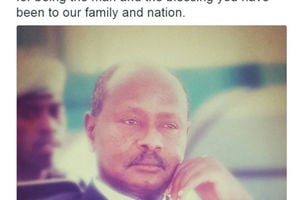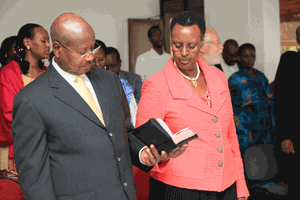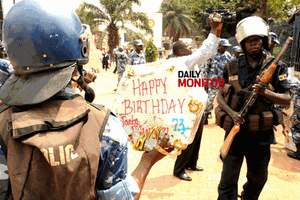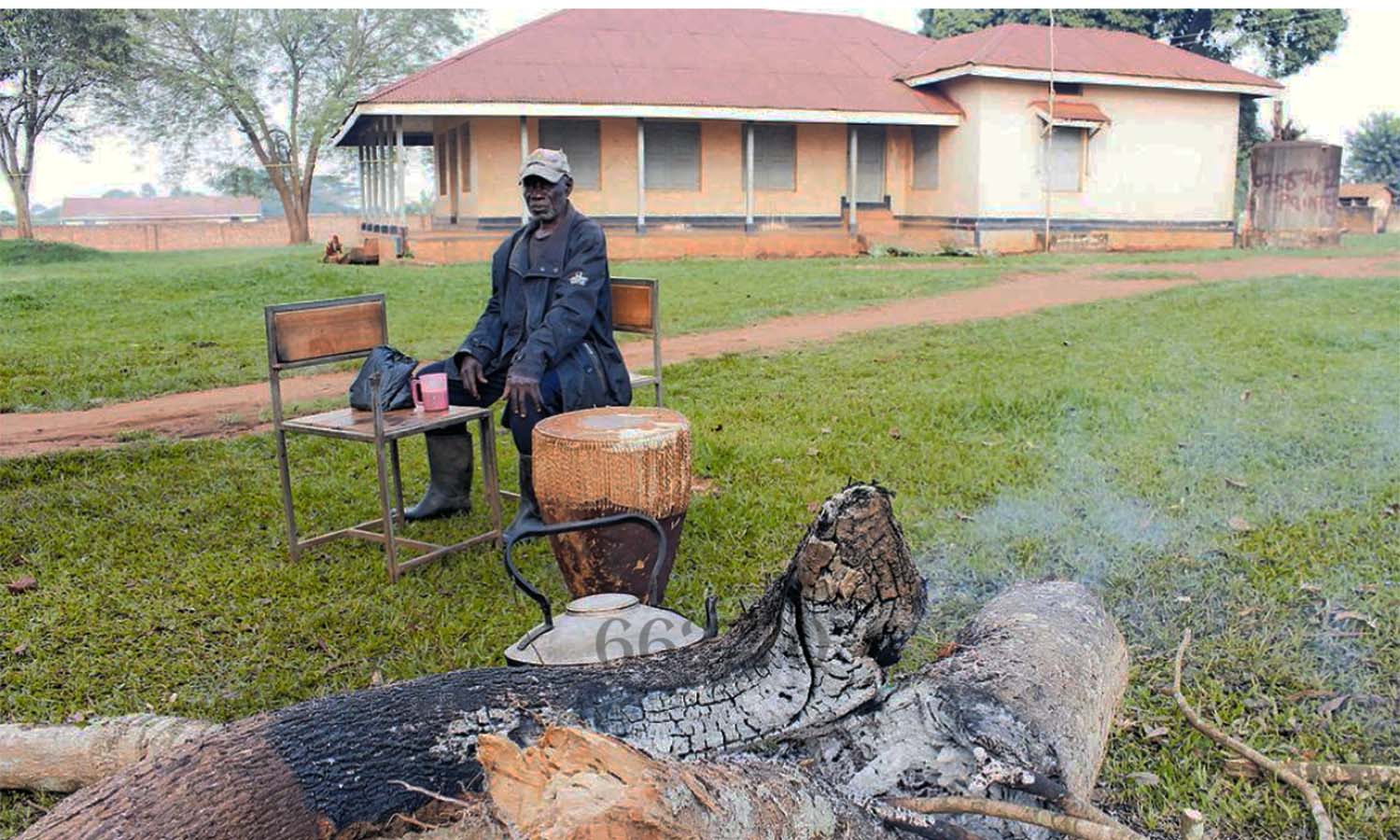
President Museveni and First Lady Janet Museveni Janet Museveni cutting cake dedicated to him by the cabinet on Monday at State House Entebbe. PPU PHOTO.
President Museveni turns 80 today, with a mass celebration open to all Ugandans planned at Kijjaguzo, Semuto Town Council, in Nakaseke District, Central Uganda. The general public has been invited to attend the celebrations confirmed by the State House as a “thanksgiving gathering/rally” that will start at 9am.
“It is mainly a thanksgiving and you are welcome to hear words of wisdom from H.E., the President,” Sandor Walusimbi, the President’s principal press secretary (PPS), said.
This is the second time Mr Museveni will mark his birthday as a mass celebration, a trend analysts say is more of a political tool than a celebration of life.
To mark his 79th birthday last year, party leaders led by the National Coordinator in the Office of the NRM National Chairperson, Ms Hadijah Namyalo, organised a party for the President at Kololo Independence Grounds on September 8. The celebrations were held jointly with the memorial of the Katonga heroes under the theme “Celebrating Jjaja: Lessons from Katonga.” They drew leaders from the party, with hundreds of young people reportedly ferried from city places to fill up the grounds.
Before that, Mr Museveni marked relatively low-key celebrations with his inner sanctum. For his 70th birthday, he attended a thanksgiving service at Nshwere Church of Uganda and then a “ceremony organised by the children and attended mainly by family” at his country home in Rwakitura District. The next year, in 2015, he spent part of his birthday at the Mount Zion Prayer Centre, Bukalango.
In 2016, there were no official celebrations, with Lindah Nabusayi, the President’s PPS then, disclosing that he was working.
“There are several functions. He has about five meetings. If there is any celebration, then maybe a private family function later,” Ms Nabusayi told this newspaper back then.
Mr Museveni spent his 75th birthday at his farm in Kisozi, Gomba District, grazing cattle, only acknowledging well-wishers on social media.
Why the shift?
The shift from not knowing his birthdate to national celebrations, analysts say, bears the hallmarks of the prevailing social norms. More than that, they add that it serves as a new political tool for someone who has actively been in the game for close to five decades.
“It is instrumentalised for political mobilisation. You hear people going for thanks giving when the reason passed a long time ago. They [the thanksgivings] are an instrumental space for political mobilisation. Birthdays are usually private, but they have become symbolic politics,” Mwambutsya Ndebesa, a history lecturer at Makerere University, said.
Moses Byaruhanga, a senior presidential adviser, on his part contends that while the older persons did not grow up celebrating birthdays, the influence of younger generations, who tend to make a big deal out of birthdays, has registered on their parents.
“If you forget, they will remind you. That is how President Museveni came to celebrate his birthday—from the children, now grandchildren … those people will celebrate him,” he opined, adding, “They have involved more people and made it public, maybe to remember the revolution, and where it started from. He is a political leader and people have been invited to join him.”
Dr Gerald Karyeija, an associate professor of Public Administration and dean of the School of Management Sciences at Uganda Management Institute, says it is an attempt to create affinity and soften the political ground.
“It is the nature of our politics that he has been made into a grandfather and father of the nations with words like Bazzukulu. It is building on the African foundation of a family…so when the birthday comes, it is like building the sentiments of we are the same family, in one family and we are celebrating Jjaja’s birthday, bringing a social dimension to a political question,” he said.
“When you celebrate his birthday and everybody is sending messages, it goes outside the confines of power and brings him apparently closer to the people. In the political space, it is an opportunity to run an opinion poll on how people feel about the person of Museveni. It is even at a time when we are getting into a political season. If the sentiment coming out is largely favourable then they assume it translates into endearment to him as a candidate. If it is the opposite, it gives them political work to create love for him,” he added.
Dr Karyeija also opined that the mass celebrations may seek to legitimise the President’s heritage and facts around his birth which have been a point of contention.
“At a certain point there was contention about his birthday and it was settled. It is affirmation and confirmation and legitimising that which was agreed upon,” he told Sunday Monitor.
‘The most probable birthday’
Mr Museveni chronicles how he settled on September 15 as his date of birth, after years of uncertainty and contention, basing on accounts of his mother and others present when he was born in 1944. In the second edition of his memoir, Sowing the Mustard Seed, he writes: “I was born in the old government hospital at Mbarara near the town clerks premises. One would have thought that would have made my birthday very easy to establish. That was the exact opposite. My own parents never bothered with knowing birthdays in exact terms.”
He adds: “In the early years, I didn't bother knowing more than that. In any case, we had real life-threatening challenges such as extra-judicial killings and looting of people’s properties, among others. We had no time to worry about details such as dates of birth. It was in 1979 after the defeat of Amin that I started seeking to know the exact date of my birth…I could accordingly declare the 15th of September as the most probable birthday.”
President Museveni’s age became a sticking political issue in the run-up to the 2016 election. Some members in the Opposition often argued he was older than his official age. In 2012, members of the Uganda Young Democrats (UYD) in Masaka were arrested for staging a celebration to mark his ‘75th birthday’, which they claimed was his real age. They wanted him to retire and not contest the 2016 election. At the time, the Constitution capped the age limit for one to be President at 75. The clause has since been removed, leaving it open for any Ugandan of any age to contest for the top political job.
Museveni has stayed in office since, and will at the end of this term have led Uganda for 40 years. This after having barrelled his way into power in 1986.
To Gen (rtd) Mugisha Muntu, President Museveni’s Bush War comrade who currently heads the Alliance for National Transformation (ANT), that Museveni—the man who upon taking over the presidency at 42 attributed many of Africa’s problems to leaders overstaying in power—is still President at 80 years is proof of loss of values.
“Sticking to principles is not an easy thing most times for many human beings, and when a person gets into power, or they have a lot of money, there is a tendency that many people get destabilised by things which exude power…it takes strength of character, steadfastness in terms of adhering to principles not to get confused,” Mr Muntu said, adding, “It is not only here, you see it all over the world. There are people who remain stable and humble in doing things which are important to other people's lives, but there are others who get overwhelmed and lose track. Every human being must choose. Gen Museveni says one thing and does something completely different, but time catches up.”








